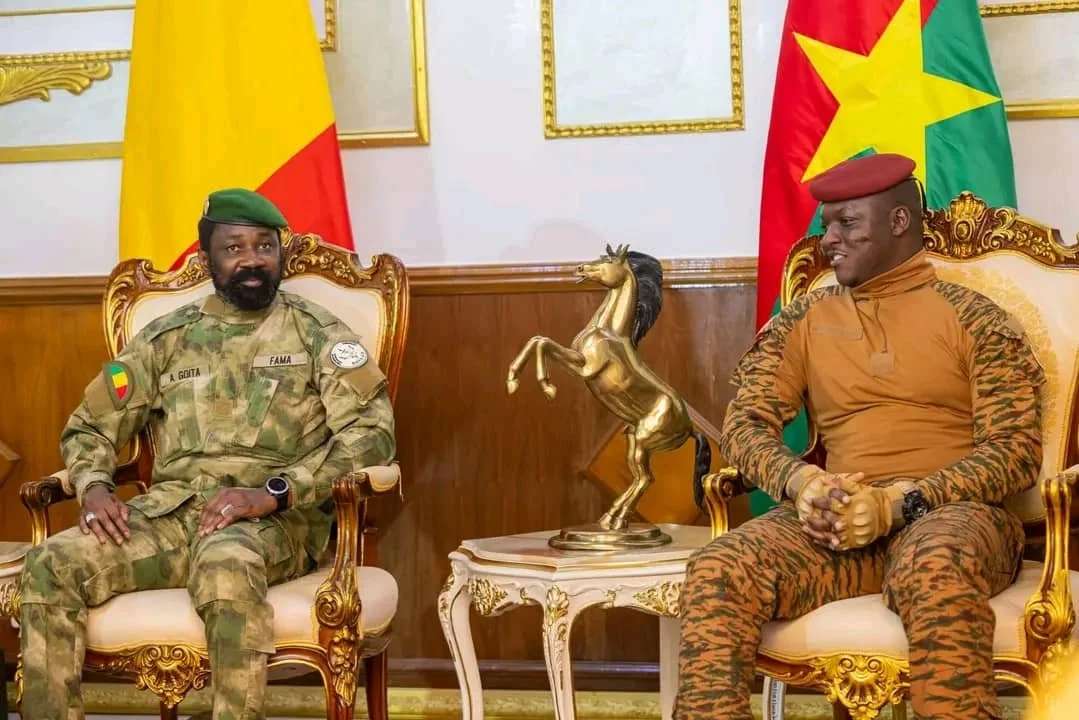Mali and Burkina Faso Continue Crackdown on Civic Rights with Impunity
General Assimi Goita (Mali Leader) and Captain Ibrahim Traore (Burkina Faso) © WADR
Mapping shrinking civic space in West Africa’s military-led States - Part 3
By the Media Foundation for West Africa, published on 29th July 2025
This edition of This Week in the Sahel spotlights growing authoritarianism and shrinking civic spaces in Mali and Burkina Faso. Recent developments, ranging from the arrests of public figures and journalists to arbitrary travel bans highlight an escalating assault on civil liberties.
In response, the Media Foundation for West Africa (MFWA) calls for transparency in legal proceedings, an end to unjust restrictions on movement, and accountability for human rights violations, including the case of missing journalist Serge Oulon.
On Tuesday, July 23, 2025, Mali witnessed a disturbing crackdown on cultural freedom when three celebrated female singers: Babani Koné, Binguini Bagaga, and Mariam Bah were arrested and immediately remanded into custody by the prosecutor of Le Pôle national anti-cybercriminalité.
These artists, all of who have large social media followings, face charges of ‘mutual insults’ and‘ indecent assault’. Their trial is scheduled for September 4, 2025.
The swift detention of the singers following their summoning by the cybercrime unit has sparked public concern and outrage among fans, civil society actors, and human rights defenders. Many view the charges as an abuse of cybercrime laws to muzzle influential voices in the arts and culture space.
The arrests reflect a deepening pattern in Mali, where state institutions are increasingly used to stifle dissent and control public narratives, particularly those shared on digital platforms.
Further compounding the repression, former Prime Minister Moussa Mara was prevented from leaving Mali on Monday, July 21, 2025, despite there being no official restriction on his travel. Accompanied by his children, Mara was heading to Dakar to speak at a peace conference organized by a German international institution when he was stopped without explanation.
According to sources contacted by MFWA, neither judicial nor military authorities issued a notice restricting Mara’s movement, and his passport remains valid.
The lack of transparency and legal basis for the travel restriction raises concerns about the growing use of arbitrary tactics by Mali’s transitional authorities to control civic participation and silence public figures.
Another troubling development came with the sentencing of journalist Seydou Oumar Traoré. On July 14, 2025, he was handed a six-month prison term and fined one million CFA francs (about USD 1,650).
The journalist who is also the director of Radio Baoulé had suggested that Guinea was being used as a rear base by armed groups hostile to Mali, and accused certain Guinean military officials, in particular the head of state, General Mamady Doumbouya. Despite releasing a video apologising for his comments, he was prosecuted for insulting a foreign head of state.
In Burkina Faso, there was a rare but cautious moment of relief as four journalists: Boukary Ouobo, Luc Paguebelem, Guezouma Sanogo, and Phil Roland Zongo, were released after being detained for several months near the frontline of military operations. Their arrests had drawn significant criticism from press freedom advocates who denounced the regime’s attempts to intimidate and suppress critical media.
The four journalists had been accused of exposing or challenging military narratives around Burkina Faso’s counter-insurgency operations. Their release, while welcome, is overshadowed by the unresolved case of Serge Oulon, editor-in-chief of L'Évènement newspaper. Oulon was abducted from his home by unidentified individuals a year ago. To date, there has been no credible information about his whereabouts, and no effort by the authorities to investigate or account for his disappearance.
The MFWA welcomes the release of the four journalists in Burkina Faso but insists that the freedom of the journalists should not be mistaken as a benevolent act by the military regime. They were punished merely for exercising their right to free expression, a right enshrined in both national laws and international human rights conventions. Journalism is not a crime!
The MFWA reiterates earlier calls to regional and international partners fighting for freedom of expression and democracy in West Africa to take steps to counter the growing assault on free expression and civic space in the Sahel.

